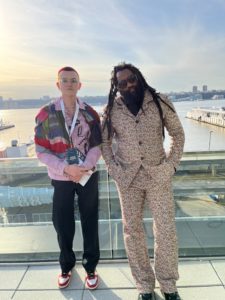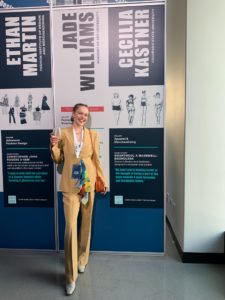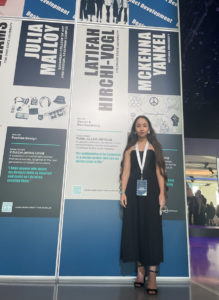
Every year Colorado State University’s Department of Design and Merchandising encourages students to submit work for consideration to the Fashion Scholarship Fund – and supports strong applications through an online summer course. FSF is an education and workforce development non-profit that provides $1 million in scholarships each year to up-and-coming students preparing to enter the fashion industry. This year, five CSU students in the apparel and merchandising major and concentrating in apparel design and production received a scholarship for their incredible work and research: Krista Melusky, Graeme MacInnis, Caroline Floyd, Cecilia Kastner, and Latifah Hirchi-Vogl.
“This is a really big deal for our students,” said Kevin Kissell, assistant professor in the Department of Design and Merchandising and a mentor for the FSF students. “Once a student wins the scholarship, they become part of a stellar network of fellow students from around the US, industry mentors, and gain opportunities for internships and careers.”
Kissell teaches the course that prepares students for this scholarship opportunity. The eight-week online course focuses on the four different FSF case study prompts. “In a nutshell, this class gave students the chance to work on their case studies, interact with past FSF winners, and hear from a number of industry and academic professionals,” said Kissell.
Scholarship Recipients
Each of the students submitted a case study with deep research on every level of the design, marketing, and garment development process, from executive summary, to technical flats, to marketing strategies. The CSU award winners represent a diverse array of interest areas. Learn more about the students’ case studies with the links below.
Krista Melusky
Krista Melusky’s case study proposed a partnership with Target to create an athleisure collection addressing the post-covid consumer need for apparel that supports both physical and mental health as they emerge from lockdown. She conducted research into deep touch point stimulation and its effects on stress and anxiety as a part of the project.
Melusky’s senior design collection recently won the award for Excellence in Design at this year’s Design and Merchandising Fashion Show: All in Bloom. She earned her bachelor’s degree in May 2022.

Graeme MacInnis
Graeme MacInnis presented FSF with a case study detailing a clothing line partnered with PlayStation bringing comfortable, lifestyle-friendly clothing to the millennial gaming demographic. “I learned that if I really set my mind to something, and truly push myself, I really can achieve great things,” said MacInnis. He prepared his FSF case study while also working part-time, taking 15 credits, and starting his own clothing line.
While MacInnis is still deciding what role he’ll play in the fashion industry, he was energized by his first trip to New York to attend the FSF Live Gala. “I’ve come back feeling so excited to keep on the path I’m going and keep creating!” said MacInnis. “I feel like I just touched the stars for the first time, and I can’t wait to do it again.” Entering his senior year, MacInnis has more opportunities to shine ahead.
Caroline Floyd
Caroline Floyd’s case study proposed an opportunity for expansion for a brand called Sororite Vintage, a luxury sustainable, reworked clothing brand, as her case study. The brand sells high-end, one-of-a-kind vintage garments at a high price point. She suggested expanding brand reach by developing a seasonless collection made from deadstock fabrics and selling it in collaboration with Showfields NYC, a physical retail platform for many brands located in NYC. Floyd will extend her design aesthetic and research ideas as she heads into her senior year.

Cecilia Kastner
Cecilia Kastner’s case study drew on personal experience with Merino wool underwear. Kastner examined a possible collaboration between the brands Madewell and Smartwool to create a line of “Merino wool bodywear designed to empower and protect.” She conducted market research through a survey distributed on campus as well as an in-depth analysis on the properties of Merino to inform her project.
The trip to New York to accept the award was eye-opening for Kastner. “People who we all look up to in the industry are incredibly talented and experienced in what they do, but they’re humans just like me and you,” said Kastner. “My dreams feel a little less outlandish after having even minimal contact with these big names. New York freed me from fear of failure and pushed me further towards my future.” With two more years in the program, Kastner will no doubt draw inspiration from her minor in women’s interdisciplinary studies as she refines her research and design skills.

Latifah Hirchi-Vogl
Latifah Hirchi-Vogl developed her case study during the summer course. “Mr. Kissell’s course last summer taught me a lot about the design process and the mentoring gave me skills and encouraged me,” said Hirchi-Vogl. Her case study focused on a women’s travel capsule collection for TUMI luggage designed to provide versatility as well as health and safety features. “I feel proud to be a part of the cohort of CSU students who were awarded this scholarship,” said Hirchi-Vogl. “We are fortunate to have outstanding faculty and first-rate facilities; the Apparel Design and Production program really helps us to be well-rounded in our field.”
Fashion Scholarship Fund
Each FSF scholarship recipient was awarded $7, 500 this year. Nationwide, 459 students submitted work for consideration for the scholarship with 123 applicants receiving scholarships. Five of these 123 come from CSU, demonstrating immense student talent and high-quality applications.
The money can be used for anything to further their design career, from tuition to materials to living expenses.
The FSF acknowledges that sometimes even the best and brightest struggle to enter the fashion industry. The scholarship money is just one part of a multi-step approach to progress the most talented students into promising careers in the future.
“Not only do they get the chance to win a sizable scholarship,” said Kissell, “but they also get to participate in an amazing FSF Summer Series which consists of nine weeks of robust programming including workforce preparedness courses and master classes.”
CSU mentorship helps with student success
“Each week we invited a speaker to discuss topics related to the FSF case studies,” Kissell said of the summer course.
Last year, one of these guests was Bee Pettner (’20), an alumna of the department and a two-time FSF winner. She talked to the class about her experiences and gave tips on creating a professional case study.
“The course also gave students the opportunity to discuss ideas and receive feedback and critique regarding their ideas,” said Kissell. “The case studies are difficult and require a lot of thought and industry knowledge.”
The course will be offered again this summer, supporting a new cohort of students with incredible industry partnerships and support.
The Department of Design and Merchandising is part of CSU’s College of Health and Human Sciences.